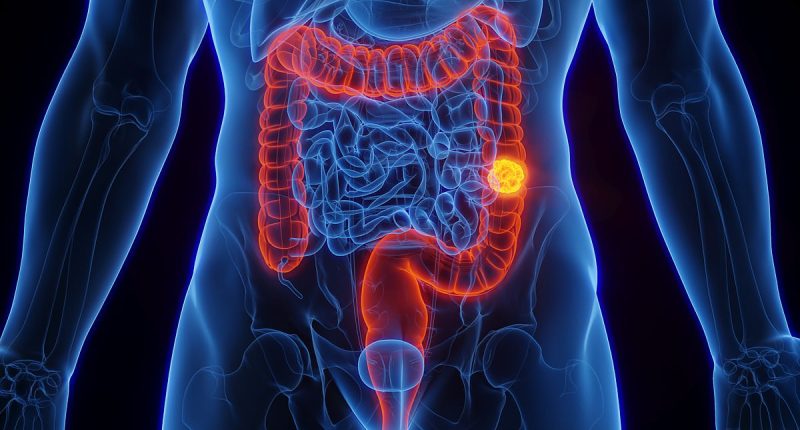Share this @internewscast.com
It sounds too simple to be true. Exercise works just as effectively as a drug to slash the risk of dying from bowel cancer, leading experts have found.
In a world-first trial spanning six nations, including the UK, Canada and Australia, hundreds of patients – who had already had treatment for the disease – saw their risk of death cut by more than a third just by taking up an exercise programme.
This was no gruelling regime – no gym membership needed. It simply required 20 minutes of moderate activity each day.
Some trial participants were offered fortnightly advice sessions with personal trainers for the first six months, and monthly thereafter, while others were merely given leaflets about healthy living.
The results for the first group were astonishing. After five years, those exercising every day were 28 per cent less likely to have died or see their cancer grow or return.
By eight years, their risk of dying was 37 per cent lower – for every 14 participants, exercise prevented one from dying.
When these results were announced to a packed audience of cancer doctors last week at the American Society of Clinical Oncology’s annual conference in Chicago, there was a standing ovation.

In a trial of hundreds of bowel cancer patients, after five years, participants exercising every day were 28 per cent less likely to have died or see their cancer grow or return
I was there, and leading bowel specialists I spoke to in the days afterwards told me that they had already had patients asking how they could begin similar regimes.
The answer, according to the study authors, is surprisingly simple.
Dr Sharlene Gill, a gastrointestinal oncology expert at the University of British Columbia, said: ‘In the first three months, the goal is to increase physical activity beyond what we call ten MET hours per week.’
MET refers to ‘metabolic equivalent of task’ – a scientific unit that measures energy burned. Ten MET hours is the equivalent of around two and a half hours of brisk walking, or a mix of moderate activity across the week.
And the brisk walk, she insisted, need not be too taxing, adding: ‘It’s not quite running but, equally, not a stroll. If you saw someone on that walk you’d think, “They’ve got somewhere to be.”
‘It doesn’t have to be walking. Ten METs is also equivalent to about an hour of jogging or more vigorous exercise each week. This could be three 20-minute runs, swims or cycle rides. It’s simply aerobic exercise, not weight or strength training.
‘After three months we want to increase activity levels to 20 MET hours per week – roughly five hours of moderate activity such as brisk walking or two more vigorous ones. This could be football, tennis or dance for example.
‘And you don’t have to stick to one exercise – it’s any combination you feel comfortable with. The benefit was not just in bowel cancer, it lowered the risk of other cancers developing, too, like breast and prostate.’
The need for such solutions is clear. Every year 44,000 Britons are told they have bowel cancer. And while overall rates are stable or have declined slightly in older age groups, cases among younger adults are increasing.
England has experienced one of the fastest rises in early-onset bowel cancer worldwide, with an average annual increase of 3.6 per cent between 2007 and 2017 among under-50s.
Although the disease remains relatively rare in younger adults – accounting for about five per cent of cases – this upward trend has baffled experts.
Moreover, bowel cancer death rates among under-50s were projected to rise by 39 per cent for women and 26 per cent for men in 2024 compared with the average for the period from 2015 to 2019.
Regardless of survival, it is a life-changing diagnosis, not least because it often involves surgery, months of chemotherapy, radiotherapy and hormone treatments that can leave some suffering debilitating side-effects.
Such is the excitement over the findings about exercise, they already have NHS backing.
NHS national medical director Sir Stephen Powis said specialist cancer teams should now help patients increase activity after completing their treatment.
Professor Peter Campbell, a cancer epidemiologist at Montefiore Einstein Comprehensive Cancer Center in New York, said: ‘This is on par with the best treatments out there. If this were a drug, people would leave the building to go order it for their patients on Monday morning.’
The conference wasn’t just about bowel cancer, though.
Read on to learn about some of the other discoveries presented to delegates.
Immune booster cuts lung cancer deaths
Every ten minutes someone in the UK is diagnosed with lung cancer. Just a quarter survive for five years, making it this country’s biggest cancer killer.
But there is hope for those with one of the most aggressive types, small-cell lung cancer, which affects 7,000 people a year and is typically caused by smoking.
Treatment has remained largely unchanged for decades, with most receiving regular doses of chemotherapy and radiotherapy. When this doesn’t work – in up to four in ten cases – the outlook is bleak. Yet a study found offering the immune-boosting drug tarlatamab-dlle – known by the brand name Imdelltra – cut the risk of death by 40 per cent in patients whose disease worsened despite having chemo.
The phase-three trial showed a fortnightly dose gave patients an extra six months – boosting survival to 14 months compared with eight on chemotherapy.
Imdelltra works by binding to proteins on tumour cells, helping the body to spot the cells, target and destroy them.
Priced at £22,150 per cycle by its US manufacturer Amgen, it received fast-track approval from the US Food and Drug Administration last year. The NHS spending watchdog, the National Institute for Health and Care Excellence (NICE), is expected to make a ruling on it in August.
Dr Charles Rudin, a lung oncologist at New York’s Memorial Sloan Kettering Cancer Center, called it ‘a major milestone’.
Dr Catherine Meador, an internal medicine and oncology expert at the Mass General Cancer Center in Boston, added that the results ‘affirm’ the drug as ‘the new standard of care’ for patients who have already had treatment.
Fresh hope in slowing down stomach tumours
There was good news for patients with stomach cancer – a drug that extends life for those with an early-stage form of the disease. Despite significant advancements in treatment, stomach cancer remains one of the hardest to treat, and is the fifth leading cause of cancer-related deaths worldwide.
For patients in its early stages, when it has not begun to spread, just under half remain cancer-free after treatment. For most it returns within two years.
But a phase-three trial at the Memorial Sloan Kettering Cancer Center found that offering the drug Imfinzi extends patients’ lives by slowing this spread. Added to the standard four chemo drugs used to treat early-stage stomach cancer, patients were 29 per cent less likely to die or see their cancer grow or return.
At the two-year mark, the proportion of those who were disease-free was 67 per cent on the Imfinzi-based regime, compared with 59 per cent on chemotherapy alone.
Dr Pamela Kunz, an expert in gastrointestinal cancers at Yale University, said the trial ‘defines a new paradigm’.
Dr Samuel Klempner, an oncologist at Massachusetts General Hospital, said: ‘I would start giving Imfinzi to my patients tomorrow. It really is practice-changing.’
Timing could be the key for immunotherapy
Not all the studies were about more treatments – one found the timing of treatment was vital.
According to scientists at Paris-Saclay University in France and Hunan Cancer Hospital in China, giving immunotherapy in early morning rather than the afternoon may improve survival rates.
Immunotherapy boosts the body’s immune system to fight cancer cells. Small studies have already shown similar results, but critics claim they could be skewed because frailer patients may not be able to come to clinics till later in the day.
Now, in the largest and only randomised study of its kind, researchers found morning immunotherapy boosted survival by 53 per cent.
In the five-year trial, scientists tracked 700 patients with advanced non-small-cell lung cancer in which the disease had spread to other parts of the body. This affects eight in ten UK lung cancer patients.
Of those with an advanced form, less than a fifth survive beyond a year. But those who had immunotherapy before 11.30am lived almost three years on average, beating the 19.5 months of those treated in the afternoon.
This may be because the immune system is more active early on and there are more immune cells in the blood – possibly because our body clock gets the immune system ready to face daytime threats.
Immunotherapy drugs stop cancer cells binding to T-cells – defender cells released by the immune system. Effectively, this helps to turn the immune system back on. Giving immunotherapy early in the day could supercharge this response, given there are more T-cells circulating then.
Could toxic air be fuelling the mystery of soaring diagnoses?
The rise in bowel cancer cases among younger adults is a growing concern – not just for those affected, but for experts examining what’s driving the trend.

In a major study spanning two decades, scientists at the Cleveland Clinic in the US found that exposure to fine particulate matter – known as PM2.5 – ‘significantly’ raises the risk of dying from bowel cancer
Everything from alcohol and ultra-processed foods to antibiotics and a lack of vitamin D has been blamed. But could the culprit be far more insidious – the air we breathe? Some world-leading cancer experts think the answer could be yes.
Research unveiled last week offers some of the strongest evidence yet that air pollution could play a key role.
In a major study spanning two decades, scientists at the Cleveland Clinic in the US found that exposure to fine particulate matter – known as PM2.5 – ‘significantly’ raises the risk of dying from bowel cancer.
For every one per cent rise in PM2.5 levels, deaths from the disease among the over-50s rose by 0.98 per cent. In younger adults, the risk increased by 0.24 per cent.
These tiny particles from sources such as vehicles and wood-burning stoves, are less than 2.5 micrometres wide – small enough to get into the lungs and bloodstream.
Experts believe they can then reach the gut, where they may cause DNA damage and trigger inflammation and disrupt the delicate balance of bacteria in the digestive tract – all of which can contribute to cancer development.















